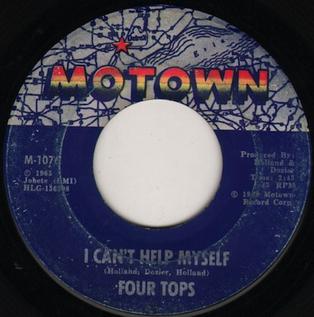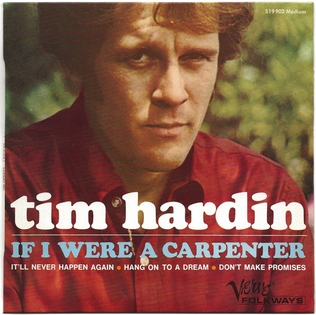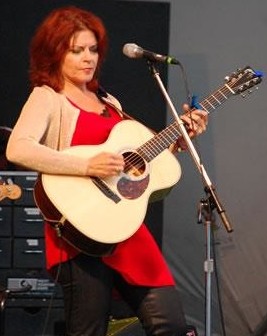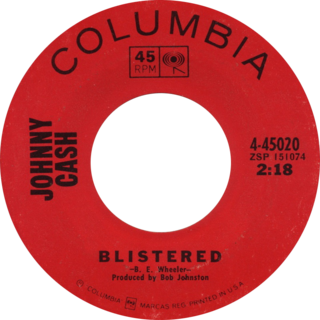
"I Can't Help Myself" is a 1965 song recorded by the Four Tops for the Motown label.

Canadian singer Shania Twain has released six studio albums, three compilation albums, three remix albums, one box set, two live albums, 45 singles, 38 music videos, six promotional singles, and made six guest appearances. Twain's repertoire has sold over 34 million albums in the United States alone, placing her as the top-selling female artist in country music. Moreover, with 48 million copies shipped, she is ranked as the 26th best-selling artist overall in the US, tying with Kenny G for the spot. She is also recognized as one of the best-selling music artists in history, selling over 100 million records worldwide and thus becoming the top-selling female artist in country music ever.

One Woman Man is an album by American country music artist George Jones, released on February 28, 1989, on Epic Records.

"If I Were a Carpenter" is a folk song written by Tim Hardin in the 1960s, and re-recorded with commercial success by various artists including Bobby Darin, The Four Tops and Johnny Cash. Hardin's own recording of the piece appeared on his 1967 album Tim Hardin 2. It was one of two songs from that release performed by Hardin at Woodstock in 1969. The song, believed by some to be about male romantic insecurity, is rumored to have been inspired by his love for actress Susan Morss, as well as the construction of Hardin's recording studio.

"Tell It Like It Is" is a song written by George Davis and Lee Diamond and originally recorded and released in 1966 by Aaron Neville. In 2010, the song was ranked No. 391 on Rolling Stone magazine's list of The 500 Greatest Songs of All Time.

"Six Days on the Road" is an American song written by Earl Green and Muscle Shoals Sound Studio songwriter Carl Montgomery, made famous by country music singer Dave Dudley. The song was initially recorded by Paul Davis and released in 1961 on the Bulletin label. In 1963, the song became a major hit when released by Dudley, peaking at #2 on the Billboard Hot Country Songs chart and cracking the Top 40 (#32) on the Hot 100, leading to it being hailed as the definitive celebration of the American truck driver.
"Detroit City" is a song written by Danny Dill and Mel Tillis, made famous by Billy Grammer, country music singer Bobby Bare and Tom Jones. Bare's version was released in 1963. The song — sometimes known as "I Wanna Go Home" — was Bare's first Top 10 hit on the Billboard Hot Country Singles chart that summer, and became a country music standard.

The discography of Rosanne Cash, an American singer-songwriter, consists of 14 studio albums, six compilation albums, and 39 singles. The daughter of Johnny Cash, Rosanne Cash recorded her self-titled debut album in 1978 under the German label Ariola. After signing with Columbia Records in 1979, Cash's second studio album Right or Wrong was released. Its lead single "No Memories Hangin' Around" reached the Top 20 on the Billboard Hot Country Songs chart. Cash's third studio release, Seven Year Ache (1981), gained major success when the title track peaked at number one on the Billboard Country chart. It was then followed by "My Baby Thinks He's a Train" and "Blue Moon with a Heartache," which also reached the top spot. The album's follow-up effort, Somewhere in the Stars (1982) produced three Top 20 hits on the Billboard chart.

The discography of American country pop singer Marie Osmond contains 12 studio albums, three compilation albums, one soundtrack album, 33 singles and 2 album appearances. She first gained exposure on television with her siblings' group, The Osmonds. She then signed her own recording contract with MGM Records. Osmond specifically chose to be marketed towards the country field. In 1973, she released her debut single, "Paper Roses." The song reached number one on the Billboard Hot Country Songs chart and crossed into the top five of the Billboard Hot 100. Her debut studio album of the same name also topped Billboard's country albums chart and spent 20 weeks on the survey. It was also her highest charting album on the Billboard 200 all-genre chart, climbing to number 59. She followed this with 1974's "In My Little Corner of the World" and 1975's "Who's Sorry Now." Both singles reached the top 40 of the Billboard country songs chart. In addition, she released two more studio albums with MGM during this period. She then began a duet career with her brother during the latter half of the 1970s. However, in 1977 she recorded a solo album of pop music entitled This Is the Way That I Feel.
"Honky-Tonk Man" is a song co-written and recorded by American singer Johnny Horton. It was released in March 1956 as his debut single on Columbia Records, and the album of the same name reaching number 9 on the U.S. country singles charts. Horton re-released the song six years later, taking it to number 11 on the same chart.
"Tall, Tall Trees" is a song co-written by American singers George Jones and Roger Miller. Jones first released the song in 1957 as the B-side to his "Hearts in My Dream" single. Miller released his version on his 1970 album A Trip in the Country.
"The Race Is On" is a song written by Don Rollins and made a hit on the country music charts by George Jones and on the pop and easy listening charts by the unrelated Jack Jones. George's version was the first single released from his 1965 album of the same name. Released as a single in September 1964, it peaked at number three on the Billboard Hot Country Singles chart and at number 96 on the Billboard Hot 100 in January 1965. Jack's version topped Billboard's Easy Listening chart and reached number 15 on the Hot 100 the same year. The two recordings combined to reach number 12 on the Cashbox charts, which combined all covers of the same song in one listing and thus gave George Jones his only top-40 hit. The song uses thoroughbred horse racing as the metaphor for the singer's romantic relationships.

"Then You Can Tell Me Goodbye" is a song written by John D. Loudermilk. It was first released in 1962 by Don Cherry, as a country song and again as a doo-wop in 1967 by the group The Casinos on its album of the same name, and was a number 6 pop hit that year. The song has since been covered by Eddy Arnold, whose version was a number 1 country hit in 1968, and by Neal McCoy, whose version became a Top 5 country hit in 1996.
"Rose Garden" is a song written in 1967 by American singer-songwriter Joe South. It was first recorded by Billy Joe Royal on his 1967 studio album Billy Joe Royal Featuring "Hush". Versions by South himself and Dobie Gray appeared shortly after the original. Gray's version became a minor hit in North America in 1969.

"Blistered" is a song recorded by American country music artist Johnny Cash. It was released in October 1969 as the first single from his album Hello, I'm Johnny Cash. The song peaked at #4 on the Billboard Hot Country Singles chart. It also reached #1 on the RPM Country Tracks chart in Canada. The song was written by Billy Ed Wheeler.

"Here We Go Again" is a country music standard written by Don Lanier and Red Steagall that first became notable as a rhythm and blues single by Ray Charles from his 1967 album Ray Charles Invites You to Listen. It was produced by Joe Adams for ABC Records/Tangerine Records. To date, this version of the song has been the biggest commercial success, spending twelve consecutive weeks on the US Billboard Hot 100 chart, peaking at number 15.
"You've Still Got a Place in My Heart" is a song written and originally recorded by American country music artist Leon Payne in 1950.
"I'm Not Ready Yet" is a song written by Tom T. Hall. It was originally released by The Blue Boys in 1968, whose version peaked at number 58 on the Billboard Hot Country Singles chart. The song was covered by American country music artist Tammy Wynette on her 1979 album, Just Tammy. It was most successfully covered by American country music artist George Jones on his 1980 album I Am What I Am. It was released in August 1980 as album's second single following the monster smash "He Stopped Loving Her Today." Jones' version peaked at number 2 on the Billboard Hot Country Singles chart. As Rich Kienzle observes in the liner notes to the 1994 Sony compilation The Essential George Jones: The Spirit of Country, the Hall composition "seemed to also reflect on George's mortality though Hall's lyrics weren't originally conceived that way."

The singles discography of American country music artist Lynn Anderson contains 72 singles, three promotional singles, one charting B-side, two music videos and nine other song appearances. She signed her first recording contract with Chart Records in 1966. The following year, her single "Ride, Ride, Ride" debuted on the Billboard Hot Country Singles chart. Also in 1967, her single "If I Kiss You " became her first major hit when it reached number five on the country singles chart. Anderson had a series of hits that reached the top ten and 20 during the 1960s including "Promises, Promises" (1969), "No Another Time" (1968), "Big Girls Don't Cry" (1968) and "That's a No No" (1969).

Charley is the twentieth studio album by American country music artist Charley Pride. It was released in May 1975 via RCA Victor Records and was produced by Jack Clement. The record was Pride's twentieth studio album released in his career and contained a total of ten tracks. The album included two singles which became major hits that year on the country chart: "I Ain't All Bad" and "Hope You're Feelin' Me ."













